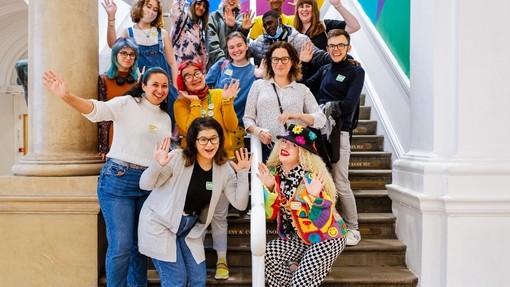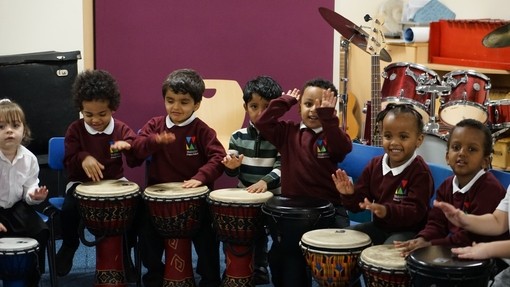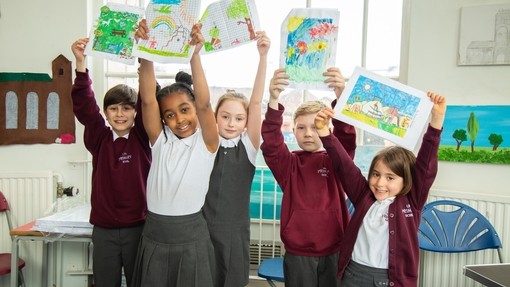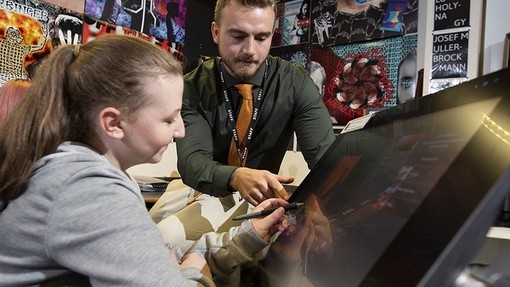
This International Women’s Day, we interview two of our Directors from the Arts Council’s Children and Young People & Learning team; Anne Appelbaum, Director of Children and Young People and Hannah Fouracre, Director of Music Education.
They are so committed to supporting young people in achieving their creative potential and being able to access the highest quality cultural experiences. We hope you enjoy reading about their careers, the role creativity played in their education and do take a moment to consider their sound advice – we’ve got an ask at the end for you and your young people.
Happy International Women’s Day!
Tell us about your role at the Arts Council? What are you most proud of?
Anne: As Director of Children & Young People at Arts Council, my role is to work out the best ways we can support the creative lives of children depending on where they live, go to school and spend their social time. I have a busy and varied job and I work with an incredible team of people who, like me, are driven to make sure that all children & young people can realise their creative potential whoever and wherever they are. The team has achieved so much over the last few years; our schools programme Artsmark is celebrating its 20th anniversary, we launched the Creativity Collaboratives which is one of the Durham Commissions key recommendations, over the course of the pandemic we sent out 45,000 packs of art supplies to families and launched The Way I See It, a gallery of original and inspirational art in partnership with Google Arts & Culture. But the thing I am most proud of is introducing youth voice within the Arts Council. We started speaking and listening directly to young people when developing our strategy Let’s Create and the value this brought to our work was clear. With the help of my colleague Naomi Kerrigan Asress, I now meet with our Youth Advisory Board every month to take their views on our policies and programmes and to try and make sure we are representing their views correctly.
Hannah: I think I might have one of the best jobs! As Director for Music Education at the Arts Council, I get to talk to young people, see them making and performing music and attend lots of gigs and concerts. I also get to work with music educators and develop national policy for music education. I help to develop a creative, diverse and inclusive music education so young people have the skills, knowledge and confidence to experience and enjoy music throughout their lives. I oversee a significant budget that is made up of taxpayers’ and National Lottery players’ money and I take my responsibility to spend public funds seriously – making sure that each pound works hard for the children it is meant for. I am most proud of establishing and overseeing the national network of Music Education Hub partnerships over the last decade. Music Education Hubs are one of the Arts Council’s truly national programmes – every part of England has one. Partners in places come together to understand the needs of young people and ensure they are supported to sing, learn an instrument, play together and progress. Each year, Hubs have supported more children, diversified the types of music and instruments and become more inclusive.

How has arts education and creativity helped you get to where you are today?
Anne: I was incredibly lucky growing up that my family encouraged us to follow our curiosity and interests. I went to a large secondary school in Toronto, Canada where the arts subjects flourished, and I spent part of my secondary education in a type of Apprenticeship working in the film and TV industry. It pushed me to use my imagination, to solve problems, to work with creative artists and to produce a tangible result. I was incredibly lucky that my family, my friends and my schools all encouraged me to follow my creative interests. That isn’t always the case and as my career has progressed, I have become more determined to do my part so that all young people can have the same opportunities as I was lucky enough to have.
Hannah: Music and culture formed a key part of my education growing up. I was one of those children that liked to do everything. I begged my parents to let me learn the violin after seeing one in the orchestra pit at the pantomime at Hull New Theatre. I started learning when I was five years old, joining my first orchestra when I was about eight – I didn’t have a clue what was going on! My primary school was lucky enough to have a classroom teacher who was an excellent musician, Mrs Redhead, and we had an amazing choir and recorder group, and we performed regularly at local festivals. At secondary school, I overcame my nerves and joined the drama club and performed in many shows. When I look back at my arts education, what stands out is how important the creative adults were in my life - my violin teacher, my primary music teacher, and my secondary school drama teacher. They inspired me, had high expectations and held me to account. My participation helped me develop skills that would be critical in my career, as well as being critical to making my childhood more fun and me a happier person.

What advice would you give to aspiring young female leaders?
Anne: Build your network. I think it’s really important for women to develop our own networks. I have an extraordinary group of women leaders in my circle (you know who you are 😉) that can reach out to each other for guidance and support any time. One of the many things they all have in common is a generosity to younger female leaders, they make time and space where they can.
Hannah: As my career has progressed, it has become clear to me just how important it is to know what your career purpose and personal values are. I recommend working yours out and to use them to drive you, your work and decisions, and act as your motivation. I think it would be very difficult working on something that was in opposition to these and it’s very important to be happy at work. It is also important to build yourself a professional network. Find people that can support and challenge you, who you can trust and become your team, outside of whatever team you may belong to within a company. I have always been surprised about how generous people can be with their time. If you meet someone you think you might get on with, or has interesting thoughts, or might be able to provide advice – just ask. Most people will say yes, and I can assure you that they will learn just as much from you as you might from them.
Your International Women’s Day action:
Whether you’re a senior leader, teacher, or young person starting out on your career, take a moment today to reflect on Anne and Hannah’s advice and think about one goal or aspiration and who you could reach out to for advice on achieving that goal. We wish you every success in life!


